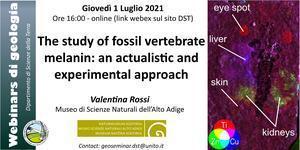The study of fossil vertebrate melanin: an actualistic and experimental approach - Dr. Valentina Rossi, Museum of Natural Sciences of Alto Adige
Da: Giovedì 1 luglio 2021 ore 16:00
Fino a: Giovedì 1 luglio 2021 ore 17:00

Fossil melanosomes – microscopic organelles that contain the pigment melanin – are a remarkable tool to infer melanin-based integumentary coloration of extinct animals. Although melanosomes in the integument are well studied, less attention has been given to melanosomes in non-integumentary tissues and their potential impact on inferences of fossil colour. Identification of integumentary melanosomes in fossils is therefore critical to studies of fossil colour. I n this study the distribution, geometry and chemistry of melanosomes in extant higher vertebrate tissues were analysed using histology, scanning electron microscopy, synchrotron-based chemical analysis. Data from fossil vertebrates from nine Konservat-Lagerstätten of different geological age are compared with the data from extant taxa.Taphonomic experiments simulated the impact of high pressure and temperature and metal-rich fluids on the morphology and chemistry of melanosomes from the skin and liver of extant amphibians. Taphonomic experiments show that during maturation, the chemistry of melanosomes from various organs converges, suggesting that similar trends reported in fossil melanosomes relate to the diagenetic history of the sediment rather than original biology. Collectively, this study provides new fundamental knowledge on the taphonomy of melanosomes, including a new tool for inferring the internal anatomy of fossils using the geometry and chemistry of preserved melanosomes. Integration of fossil data with data from extant animals can help us understand the evolution multifunctional melanin pigments through time.
Speaker: Dr. Valentina Rossi
Valentina Rossi is a palaeobiologist specialized in the study of vertebrate soft tissues, with a particular focus on melanin preservation, using chemical and experimental approaches. After graduating (both BSc and MSc) from La Sapienza University, Rome, Valentina moved to Bristol for a short internship supervised by Prof. Mike Benton. After this experience, she secured a position as a PhD student in the University College Cork, Ireland in the team of Prof. Maria McNamara. Currently, she is an employee of the Museum of Natural Science of the Alto Adige (Bolzano, Italy) working on the taphonomy of the enigmatic reptile Tridentinosaurus antiquus.
Contacts: geoseminar.dst@unito.it; giuseppe.marrama@unito.it; salvatore.iaccarino@unito.it; marcello.natalicchio@unito.it
- Paleontologia (MFN0694)





